| Srl | Item |
| 1 |
ID:
138613
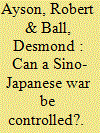

|
|
|
|
|
| Summary/Abstract |
It has been decades since the last war between major powers in Asia, but there is no guarantee that the region will always be able to avoid conflict. The greatest strain on the peace is in North Asia, where there has been rising tension between China and Japan. What begins as a
minor skirmish between China and Japan could conceivably escalate into a more serious conflict that involved the United States and, in the worst case, the use of nuclear weapons by Beijing and Washington. Even a major conventional conflict (between just Japan and China, or
involving all three) could be devastating for North Asia and the wider region, leading to a significant loss of life and widespread political, institutional and economic damage.
|
|
|
|
|
|
|
|
|
|
|
|
|
|
|
|
| 2 |
ID:
118453
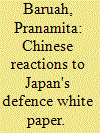

|
|
|
| 3 |
ID:
120558
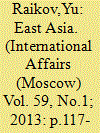

|
|
|
|
|
| Publication |
2013.
|
| Summary/Abstract |
THIS PAST SUMMER, the worsened territorial dispute in East Asia between Japan and China, Japan and the Republic of Korea, China and certain ASEAN members has appreciably soured the situation in the Asia-Pacific region. It reminded us of the fragility of peace in this exceptionally important region and placed this situation, together with the situation in the Middle East, at the top of the world's political agenda. The dispute involves three leading world nations on which peace in the international arena depends to a large extent. Located in the region are nations which are the first, second and third world economies (USA, China and Japan) with an enormous economic potential and great political influence on both the fortunes of the world economy and the situation in international relations on the whole.
|
|
|
|
|
|
|
|
|
|
|
|
|
|
|
|
| 4 |
ID:
126252
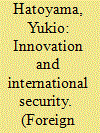

|
|
|
| 5 |
ID:
126858
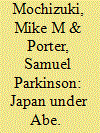

|
|
|
| 6 |
ID:
109126
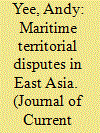

|
|
|
|
|
| Publication |
2011.
|
| Summary/Abstract |
This article systematically compares maritime territorial disputes in the East and South China Seas. It draws on the bargaining model of war and hegemonic stability theory to track the record of conflicts and shifts in the relative power balances of the claimants, leading to the conclusion that certainty and stability have improved in the South China Sea, with the converse happening in the East China Sea. To enrich the models, this article also considers social factors (constructivism) and arrives at the same conclusion. This calls for a differentiated methodological approach if we are to devise strategies to mediate and resolve these disputes.
|
|
|
|
|
|
|
|
|
|
|
|
|
|
|
|
| 7 |
ID:
120798
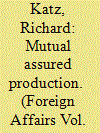

|
|
|
|
|
| Publication |
2013.
|
| Summary/Abstract |
Tensions between China and Japan are rising, but an economic version of mutual deterrence is preserving the uneasy status quo. Put simply, China needs to buy Japanese products as much as Japan needs to sell them.
|
|
|
|
|
|
|
|
|
|
|
|
|
|
|
|
| 8 |
ID:
103154
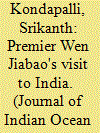

|
|
|
| 9 |
ID:
128028
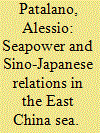

|
|
|
|
|
| Publication |
2014.
|
| Summary/Abstract |
The East China Sea (ECS) is gaining an increasingly central role in Sino-Japanese relations as it is crucial to the economic development and political affirmation of both countries, for whom the main sea routes crossing the ECS offer vital arteries for trade and energy imports. For the past year and a half, the ECS has attracted considerable international attention because of the flare-up of tensions over the sovereignty of the Japanese-controlled Senkaku Islands. This small group of islands is also claimed by the authorities in Beijing and known in Chinese as Diaoyu. Is war looming? Are we seeing an escalation spiral that will ultimately set the two countries on a collision course? The article argues that the current tensions should be seen in the wider context of the increased strategic significance of the ECS. For there are two different types of disputes here. One concerns sovereignty over the Senkaku/Diaoyu Islands; the other concerns the demarcation of the Chinese and Japanese maritime borders and exclusive economic zones (EEZ) as defined by the United Nation Convention on the Law of the Sea (UNCLOS). This distinction is important because sovereignty on land is different from sovereignty at sea. The former is connected to a vital national interest and historically, represented a primary reason for war. The latter focuses on functional rights over bodies of water included in the EEZ, not on the actual 'ownership' of the maritime realm. Accordingly, the article argues that seapower is going to play a crucial role in the projection of Japanese and Chinese power and status in the ECS and in the evolution of Sino-Japanese relations more generally. Significantly, Naval Defence doctrines in both countries have evolved greatly over recent years.
|
|
|
|
|
|
|
|
|
|
|
|
|
|
|
|
| 10 |
ID:
180309
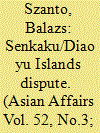

|
|
|
|
|
| Summary/Abstract |
The article takes a critical look at the current state of the Senkaku/Diaoyu Islands dispute in light of the recent escalation between China and Japan. The article's central thesis is that the practical significance of the dispute has diminished considerably due to developments in the security and economic spheres. Rather, the dispute continues to exist and escalate because of the domestic political interests of the respective governments. This recognition is important to manage the dispute effectively, to avoid hyperbolic arguments about the dispute's conflict potential, and similarly to avoid undue comparisons with the South China Sea. This article adopts a realist, rational-choice based approach to demonstrate the diminishing nature of the security and economic significance of the islands, which underpins a decreasing rationale for actively seeking an alteration of the status quo. The question of why the dispute continues to escalate is highlighted in the article's examination of how the Liberal Democratic Party of Japan and the Chinese Communist Party use the islands as a political symbol to pursue their own domestic and regional political agenda, in a way only tangentially connected to the actual dispute.
|
|
|
|
|
|
|
|
|
|
|
|
|
|
|
|
| 11 |
ID:
119759
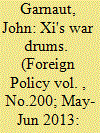

|
|
|